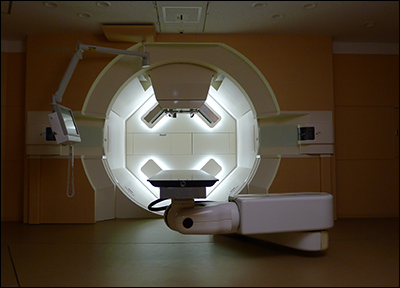Johns Hopkins Medicine celebrates opening of the Johns Hopkins National Proton Center at Sibley Memorial Hospital in collaboration with Children's National Hospital

Pediatric and adult cancer patients in the District of Columbia and elsewhere will now have access to one of the most advanced, lifesaving proton technologies offered in the U.S. at the newly opened Johns Hopkins National Proton Center at Sibley Memorial Hospital in collaboration with Children’s National Hospital
The new Johns Hopkins National Proton Center at Sibley Memorial Hospital is part of the Johns Hopkins Sidney Kimmel Comprehensive Cancer Center in Baltimore, Maryland. U.S. News & World Report recently ranked the Kimmel Cancer Center 4th in the nation in its annual ranking of best hospitals. Through its collaboration with Children’s National - rated by U.S. News & World Report as one of the top ten nationally for pediatric cancer care - Sibley houses the only proton center in the Greater Washington, D.C. region with a dedicated pediatric team.
Adults and children are now being seen at the 80,000+ square foot proton center, one of the largest and most advanced such facilities in the nation. The proton collaboration with Children’s National Hospital represents an expansion of the earlier collaboration between Children’s and Johns Hopkins Medicine that established the pediatric radiation oncology program at Sibley, which treats a broad range of children’s cancers.
“This collaboration between the Johns Hopkins Sidney Kimmel Comprehensive Cancer Center, Sibley Memorial Hospital and Children’s National will transform cancer care throughout D.C., this region and beyond,” said Hasan Zia, M.D., interim president and CEO of Sibley Memorial Hospital. “We’re doing more than just providing the most advanced proton therapy available. We will be conducting groundbreaking research that will potentially help expand this technology for use in treating other types of cancers while at the same time helping improve the effectiveness of the proton treatments for the cancers currently most amenable to proton therapy.”
The new proton center offers state-of-the-art pencil beam proton therapy equipment, as well as next-generation imaging technologies such as dual energy CT-guided treatment that reduces the range of error, and the latest innovation in biomatrix MRI designed to target moving tumors in places like the lung and liver. A large mechanical arm called a gantry can move the beam 360 degrees around the patient, treating the tumor from several angles as it destroys tumor cells layer by layer.
“The opening of the proton therapy center will offer the most advanced cancer treatment to help kids lead better lives,” says Kurt Newman. M.D., president and CEO of Children’s National. “Not only does this allow children in our region to receive proton therapy closer to home, but the center is one of a few nationally that will have a dedicated pediatric team.”
“Proton therapy is an advanced technology that allows radiation to be delivered precisely to cancer tissue,” says Jeffrey Dome, M.D., Ph.D., vice president for Cancer and Blood Disorders at Children’s National. “This provides a significant advantage compared to conventional radiation therapy, especially in children, where sparing the healthy tissue that surrounds the tumor may be critical for normal growth and development. Proton therapy shows great promise to reduce long-term side effects of radiation treatment.”
The Johns Hopkins National Proton Center at Sibley will also have a fully integrated research room, which will allow clinical, basic science, and medical physics faculty to advance clinical trial research, translational research, and technology development research in proton therapy. There, experts will lead efforts to study proton outcomes for sarcoma, gynecological tumors, pancreatic and liver tumors, lymph node cancers and tumors located near the heart and major blood vessels such as lung or breast cancers. In addition, the researchers will examine how the cancer cell-killing proton energy interacts with the cells and tissue surrounding the tumors. New advances in proton therapy will thus be developed and quickly translated into clinical practice.
“Our center is one of only a few academic programs in the country with a team conducting biologic research to improve proton therapy in addition to clinical trials comparing proton and more traditional photon therapy,” says William Nelson, M.D. director of the Sidney Kimmel Comprehensive Cancer Center at Johns Hopkins. “This research is critical to determining which type of treatment is best for each individual situation. Through this work, our researchers will provide the knowledge necessary to make cancer treatment more personal, precise and effective.”
“Proton therapy is advanced radiation treatment that is directed precisely at cancerous tissue in adults and children,” says Akila Viswanathan, M.D., interim director of the Department of Radiation Oncology and Molecular Radiation Sciences for Johns Hopkins Medicine. “This is a significant improvement over conventional radiation treatment for many cancers, especially in children, which has a greater risk of damaging the healthy tissue surrounding the tumor. Conventional therapy carries the risk of causing health issues that manifest themselves long after treatment, such as cognitive or development impairments or heart disorders.”
“Children with cancer will have access to the highest level of care from specialists dedicated to caring for children,” says Matthew Ladra, M.D., director of Pediatric Radiation Oncology at the Johns Hopkins Kimmel Cancer Center at Sibley Memorial Hospital and radiation oncologist at Children's National. “This is far more than an investment in expensive pieces of machinery. This is a collaboration that establishes a unique care continuum centered on pediatric oncology patients and their families. It brings together national and international leaders in academic research and clinical medicine to collaborate on the goal of advancing pediatric oncology treatment.”
Dr. Christina Tsien has been appointed clinical director of Radiation Oncology, including the new Proton Center and Dr. Curtiland Deville will serve as the associate proton director, while maintaining his role as the clinical director for the Radiation Oncology Clinic at Sibley Memorial Hospital.
In addition, through a strategic partnership with Howard University, the proton center will serve as an educational and training site for students enrolled in Howard’s medical physics program.
The Johns Hopkins National Proton Center is opening in phases. The first treatment room opens in October 2019. The second room is scheduled to open in spring 2020, and the third room and fixed beam research room are scheduled to open in fall 2020.
About the Johns Hopkins Kimmel Cancer Center
Since its opening in 1973, The Johns Hopkins Kimmel Cancer Center has led the world in deciphering the mechanisms of cancer and new ways to treat it. The strength of our research and treatment programs was recognized early on by the National Cancer Institute, becoming one of the first to earn comprehensive cancer center status and recognition as a “Center of Excellence.” The Johns Hopkins Kimmel Cancer Center has active programs in clinical research, laboratory research, education, community outreach, and prevention and control. Patients who visit the Sidney Kimmel Comprehensive Cancer Center at Johns Hopkins have access to some of the most innovative and advanced therapies in the world. Because Kimmel Cancer Center clinicians and research scientists work closely together, new drugs and treatments developed in the laboratory are quickly transferred to the clinical setting, offering patients innovative therapeutic options. A list of the major accomplishments of the Kimmel Cancer Center can be found here.
About Sibley Memorial Hospital
Sibley Memorial Hospital, a member of Johns Hopkins Medicine, in Northwest Washington, D.C., has a distinguished history of serving the community since its founding in 1890. As a not-for-profit, full-service, 318-bed community hospital, Sibley offers medical, surgical, intensive care, obstetric, oncology, orthopaedic, skilled nursing inpatient services, and a state-of-the-art 24-hour Emergency Department. Sibley’s campus, with its new patient tower, is also home to the Johns Hopkins Kimmel Cancer Center, the Johns Hopkins National Proton Therapy Center, Grand Oaks, an assisted living residence, a medical building with physician offices as well as ambulatory surgery and imaging centers.
Media Contact
Related Departments
This is a carousel. Use Next and Previous buttons to navigate, or jump to a slide with the slide dots.





